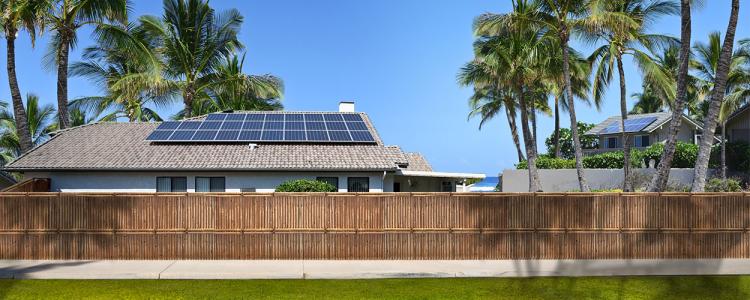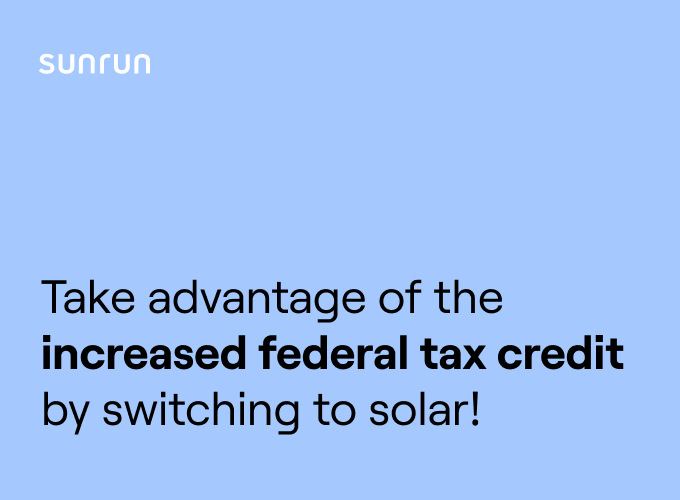Do Solar Panels Increase Home Value?

Solar Panels and Battery Storage Can Help You Build Long-Term Financial Gains
Savvy homeowners, potential buyers and appraisers know that solar panels and battery storage can increase your home’s value on the real estate market.
Specific numbers vary between each installation and property. Yet recent studies show an average increase in resale value between $4,020 and $5,911 for each 1 kilowatt of solar panels installed.1,2
At $4,020 per kilowatt, a 5 kilowatt solar panel installation would add an average of $20,100 to the market value of a mid-sized U.S. home. Or in California at $5,911 per kilowatt, a small 3.1 kilowatt system would add an average of $18,324 to the value of a mid-sized home.2 That’s an appreciable amount that homebuyers are willing to pay. And, a solar home’s selling price is typically 3.74% higher or more than comparable properties without solar.3
The price of an average rooftop solar installation and battery is generally recouped in the home’s sale price. Plus, households purchasing solar are rewarded with lower energy bills and healthy tax incentives that can cover the system’s costs multiple times over the life of its warranty.
Buyers Appreciate Solar’s Added Value
Buyers consider monthly electric bills when purchasing a home. So when assessing the long-term financial value, they’re increasingly open to the premium of a solar-ready home.
The National Renewable Energy Laboratory notes that installing solar panels is viewed as an upgrade, just like a renovated kitchen, and homebuyers across the country are willing to pay a premium for the economic and environmental benefits of a solar home.4
With lower monthly electricity bills and tax incentives for new installations, homeowners can realistically anticipate not only recovering their initial investment but also gaining a handsome return on their investment. If you purchase a solar energy system, you can expect to add a sizable percentage to your property value. It’s the smart, sustainable energy solution and is encouraging more Americans to go solar every day.

See if you qualify for the
26% federal tax credit
Thanks so much! We'll call you shortly.
Sorry, we are not taking new customers in your area yet
Refer a friend. Get $1000
Factors Influencing Solar’s Added Value
The added property value from a solar energy system constitutes many factors and varies by market. The value added to a home from solar panels can vary based on the following: 5,6,7
- Region of the country
- Local price of electricity
- Solar installation prices
- System replacement value
- Environmentally conscious community
- Frequency of power outages
- Age of solar system
- Amount of energy generation
- State incentives
- Local understanding of solar technology and benefits
Homeowner/Seller Incentives for Installing Solar Panels
In addition to increased property values over comparable non-solar homes in their community, homeowners purchasing solar systems are realizing many financial benefits including:
- State rebates and incentives (such as net metering)
- Federal solar investment tax credit (ITC)
- Replacing grid electricity with a sustainable, often cheaper option1
And, as the seller of a solar property, there are tremendous advantages in the real estate market such as:
- Higher asking price than comparable homes without solar4
- Solar panels are viewed as an upgrade by potential buyers8
- Homes with solar panels often sell faster than those without8
- 100% return on solar investment upon home sale1
Homeowners with a solar energy system who may want to sell should note that prospective buyers are interested in documentation showing that the installation was done properly from a reputable solar dealer, and proof that the system is reducing electric bills.8 Sunrun’s Solar Advisors can show you how to document the cost savings on your electricity bill.
Homebuyer Incentives for Purchasing Solar
Home seller incentives for investing in solar panels are parlayed into homebuyer incentives because a property’s market value may increase as electricity prices rise.
With a home solar installation, the buyer could potentially receive a 200% return on the sale price premium. You’ll be hard pressed to find another investment matching these financial benefits:
- Monthly/annual financial gains throughout lifetime of solar energy system (25-30 years)
- Reduced carbon footprint
- Higher resale value of home1
Do Bigger Installations Increase Home Value?
Home solar energy is yours to control while adding property value. Research shows, however, that the wattage generated by a solar installation does not proportionally raise the value of a home. So, installing a massive solar array on your rooftop won’t necessarily equate to a higher resale value. A solar installation that sufficiently meets your energy needs is enough for you to recoup the price of your installation.
Do Solar Homes Sell Faster?
The length of time that a solar powered home is on the market often varies by region of the country. While early analysis performed in six states by Lawrence Berkeley National Laboratory found that solar homes take an extra eight days to sell,9 new research shows the opposite. A solar energy installation will help sell your home 20% faster than residences without solar panels.1
Today’s rapid expansion of solar across the country is increasing appraiser and homebuyer understanding of the reliable, long-term benefits of grid-tied solar. This has accelerated the speed of sale and raised sellers’ revenue for solar homes.
New vs. Older Home Solar Systems
A newly purchased solar system with efficient technology, more time on its warranty, and less need for maintenance may significantly add to property value. Homeowners with older solar systems should factor in some depreciation and anticipate a slightly lower premium upon sale.
Even if you sell your home in the future, updating your house with a solar installation is a sound investment versus other possible renovations.
A recent report shows that the cost of a residential solar system is less than half its price in 2010.10 Following this trend, as solar technology becomes more efficient to install, there may be a smaller premium on property values. However, lower installation price and increasing electricity costs should accelerate return on investment thanks to reduced electricity bills from buying a new residential solar energy system.
Should You Buy or Lease?
Your financial goals are likely a primary factor in going solar and may impact whether you buy or lease an installation. If you purchase a new home solar system, future proceeds from an increased sale price will go directly to you.
A solar installation can only be included in a property assessment if it is owned by the homeowner and is an asset that can be transferred without obligation. The system’s warranties and performance guarantees generally transfer with the sale.12,13
To secure a higher sale price, it’s most advantageous to buy a solar energy system for your home.11 However, if you decide that a lease or Power Purchasing Agreement (PPA) is more appropriate, there will be less recouped from the home sale.
Appraisers and lenders consider that if a homeowner installs a residential solar system through a lease or PPA, it is essentially the asset of a third-party owner. This requires the third-party to be involved in the property transfer.12 Sunrun’s experienced Service Transfer Specialists make it easy to transfer your solar lease agreement to the new owners. Learn more.
Regional Markets and Electricity Costs
The largest price increases on solar properties are typically found in regions with high electricity rates and strong solar incentives. High energy costs make homes with solar installations more attractive to homebuyers. Plus, state governments are increasingly seeing the long-term community and infrastructure benefits of implementing solar incentives.12
For instance, Long Island’s high electricity rates have been a boon for the local residential solar market. The area boasts nearly 40% of all solar systems in New York state. Increasingly across the U.S., higher energy costs can translate into higher appraisals for solar homes. Low cost solar power is simply a smart investment.12
In 2015, the Department of Energy said the average homeowner adding a solar energy system could net $15,000 more at the time of sale than a comparable home without solar power.14
A new study suggests that the increase is even more significant in the Northeast’s emerging solar markets.14
Solar Value by State
While California is implementing some of the most influential policies and incentives for advancing residential solar in the country, other states have been solar-friendly for years or have recently instituted major programs to rapidly foster the development of home solar installations, battery storage and increasing property values.
7 Leading Solar States
- California
- Colorado
- Massachusetts
- New Jersey
- New Mexico
- New York
- Oregon
If you’d like to know more about solar incentives available in your area, check out the Database of State Incentives for Renewables & Efficiency.17
Rising Appraisals
According to the Appraisal Journal, a home's value increases roughly $20 for every $1 decrease in energy costs. If solar panels save a household $600 a year in electricity bills, that home's value may increase by $12,000.18 Fannie Mae has implemented a guideline specifying that if a household owns a solar energy system, the appraiser should assess its added value.19
Having an appraiser familiar with solar technology is important in getting an accurate figure for your real estate market. The three possible methodologies to value residential solar are the income approach, cost approach, and cost comparison approach. Overall, the income approach is recommended because it estimates the forward-looking value of the energy cost benefit.4
The income approach bases added value on the projected income that a solar installation will generate for the homeowner over the system’s expected lifespan. Appraising a solar home on this basis most closely aligns the seller’s and home buyer’s perspective.6
In California, which has a relatively mature residential solar market, real estate agents, lenders and appraisers have a stronger understanding of the economic benefits and value of solar installations. Plus, there are numerous comparable home sales to guide accurate pricing decisions. In other regions, real estate professionals are still learning as their residential solar market grows.8
Solar Panels Add Home Value
Installing residential solar panels is a sound investment. Whether you’re upgrading your home for a future sale or making it your forever home, your property value will significantly increase. This added value makes payback periods less of a concern.7 You can recoup your investment at a later sale and come out ahead.
Put the sun to work for you. Adding Sunrun solar panels and a Brightbox home battery to your home may not only raise your property value, it will give you control over your electricity usage, protect you from power outages and help the environment.
Solar is as reliable as the sun. See why over 250,000 Americans have added value to their homes with Sunrun—get a free quote today to get connected with our expert Solar Advisors.
Sunrun
Sources:
- https://blog.pickmysolar.com/solar-panels-increase-home-value-selling-price
- https://www.costofsolar.com/is-my-home-worth-more-with-solar-energy/
- https://unboundsolar.com/blog/do-solar-panels-increase-home-value
- http://blog.solarcrowdsource.com/homes-with-solar-sell-faster-and-15000-...
- SEIA (2018A). U.S. Solar Market Insight: 2017 Year in Review. Annual Report
- https://www.solar-estimate.org/news/research-shows-solar-adds-value-homes
- https://news.energysage.com/home-solar-power-increase-property-values-ac...
- https://us.sunpower.com/blog/2018/02/05/how-solar-affects-home-values
- https://emp.lbl.gov/sites/all/files/lbnl-1002778_presentation.pdf
- https://www.nrel.gov/docs/fy17osti/68925.pdf
- https://unboundsolar.com/blog/complete-guide-financing-solar-system
- https://blog.aurorasolar.com/does-solar-increase-home-value-the-latest-d...
- https://www.energysage.com/solar/why-go-solar/increased-property-values/
- https://pv-magazine-usa.com/2017/04/12/solar-increases-values-of-northea...
- https://www.fanniemae.com/resources/file/aboutus/pdf/solar-panels-and-ho...
- https://www.solarpowerrocks.com/state-solar-power-rankings/
- http://www.dsireusa.org/
- http://www.solar-nation.org/my-home-value-with-solar
- https://www.nytimes.com/2015/02/22/realestate/solar-panels-and-home-valu...
Recommended Articles
-

What if my solar panels don't produce enough power?
If your panels don’t produce the amount of power we said it would, we’ll pay you the difference, easy as that. Sunrun, save with the sun.
-

The Pros and Cons of Solar
Solar power is our most abundant sustainable energy source. It’s as reliable as the sun. Today’s...
-

Federal Solar Tax Credit
The federal solar tax credit gives you a dollar-for-dollar reduction against your federal income tax.
-

Power Purchase Agreement (PPA)
Pay a per kilowatt-hour rate for the electricity produced by the solar panels.